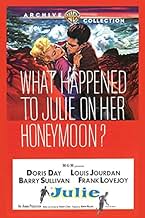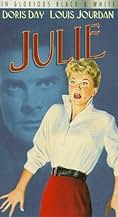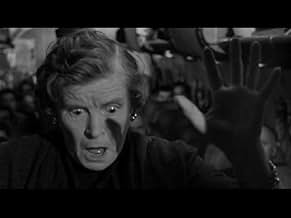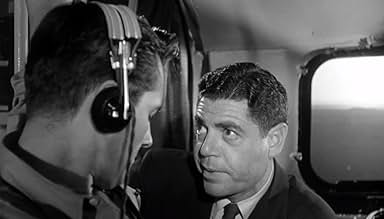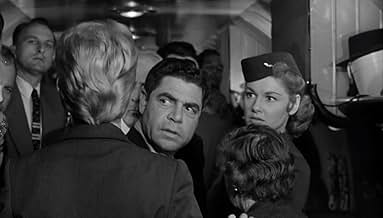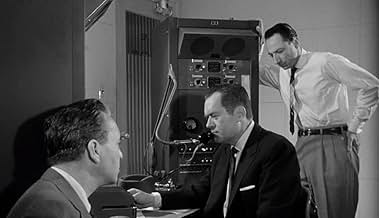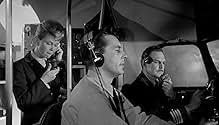IMDb RATING
6.2/10
2.4K
YOUR RATING
A terrified wife tries to escape from her insanely jealous husband who is bent on killing her.A terrified wife tries to escape from her insanely jealous husband who is bent on killing her.A terrified wife tries to escape from her insanely jealous husband who is bent on killing her.
- Nominated for 2 Oscars
- 2 nominations total
Pamela Duncan
- Peggy Davis
- (uncredited)
- Director
- Writer
- All cast & crew
- Production, box office & more at IMDbPro
Featured reviews
"Julie" starts out as a mass of tension, (other than the ridiculous rear-projection car scenes where everyone turns the steering wheel in wrong directions!) packing an intense amount of story in the first 40 minutes. By the second act, when the pace slows down, all the previous scenes seem too condensed for comfort. One scene in the beginning of the film is especially intriguing: Lyle practices his piano piece while Julie lays on the couch. Watching his hands dance over the keys, and the beautifully framed shot of him against the open window is truly surreal, almost too profound for a film of this type.
The third act, all about Doris Day landing the airplane, feels like an entirely separate movie. With the loss of the human threat after her, it stops being a thriller and becomes the tag ending of an action blockbuster. "Julie" has uneven bursts of calm and nail-biting tension, all in all a strange combination with its own memorable moments.
The third act, all about Doris Day landing the airplane, feels like an entirely separate movie. With the loss of the human threat after her, it stops being a thriller and becomes the tag ending of an action blockbuster. "Julie" has uneven bursts of calm and nail-biting tension, all in all a strange combination with its own memorable moments.
The writer-director (and producer of many other films, although not this one) Andrew L. Stone was only nominated once for an Academy Award for Best Screenplay, and he was very proud of this one. I worked for Stone in the mid-1970's, and he looked back at "JULIE" as a piece of his finest work.
The maniacal husband-as-stalker was a new kind of character for films in 1956. The honest discussion of how law enforcement often failed 'women in jeopardy' brought up issues which only became widely discussed in the 1970's.
Doris Day plays the role of a terrorized wife trying to escape from the husband who is trying to kill her, and this is such a well-done treatment of the subject that even jaded audiences today respond to it.
The climactic scene in which Doris Day lands the passenger plane with help from the control tower is riveting, because it is based on fact. Andrew L. Stone was an exhaustive researcher, and you can be sure every detail of that scene was checked and re-checked. It would have happened in real life just as you see it on the screen.
Stone kept a collection of 'true crime' magazines dating from the 1930's in his office library, and he had dozens of plot ideas for thrillers like this one. However, he had always been his own boss and not a 'studio man'. Hollywood didn't give him big budgets, and he never had the opportunity to continue his career as Hitchcock did. Mentally sharp through his 80's, Stone spent the last decade of his life trying to put deals together to make movies that never got off the ground. Our loss.
The maniacal husband-as-stalker was a new kind of character for films in 1956. The honest discussion of how law enforcement often failed 'women in jeopardy' brought up issues which only became widely discussed in the 1970's.
Doris Day plays the role of a terrorized wife trying to escape from the husband who is trying to kill her, and this is such a well-done treatment of the subject that even jaded audiences today respond to it.
The climactic scene in which Doris Day lands the passenger plane with help from the control tower is riveting, because it is based on fact. Andrew L. Stone was an exhaustive researcher, and you can be sure every detail of that scene was checked and re-checked. It would have happened in real life just as you see it on the screen.
Stone kept a collection of 'true crime' magazines dating from the 1930's in his office library, and he had dozens of plot ideas for thrillers like this one. However, he had always been his own boss and not a 'studio man'. Hollywood didn't give him big budgets, and he never had the opportunity to continue his career as Hitchcock did. Mentally sharp through his 80's, Stone spent the last decade of his life trying to put deals together to make movies that never got off the ground. Our loss.
JULIE! Doris Day runs for her life in this drama about a woman with a psychopathic husband (Louis Jourdan). The story seems to start in the middle - it begins with Jourdan trying to crash his car with Julie in it because he's jealous of her talking to someone. We learn that Jourdan, who plays a concert pianist, is Julie's second husband, her first having committed suicide. Except that apparently he didn't according to a mutual friend, Cliff (Barry Sullivan). Cliff is worried about Julie living with this nut job and thinks that hubby #2 may have gotten rid of hubby #1. Determined to find out, Julie confronts him, and he admits it. Thus begins her desperate attempt to get away from him. When she finally escapes, she goes back to her old job as flight attendant on an airline.
The story hit a little too close to home for Doris Day, who didn't want to make the film because it reminded her of two earlier marriages. And possibly her third, as Marty Melcher insisted that she do it and was unhappy when she appeared friendly with Jourdan. However, thanks to the film, she discovered Carmel and Monterey and eventually made her home there. The scenery is glorious.
Day does the narration which uses the phrase "strangely disturbing" several times. It's maybe not the best movie you've ever seen but it is very entertaining, and Doris is great as the terrified woman. What a talent, and her '60s reinvention made her bigger than ever. Jourdan is quietly terrifying, and there are many suspenseful moments in the film. Highly watchable - it's a little all over the place, starting off as one thing and ending as another - but it will really hold your interest.
The story hit a little too close to home for Doris Day, who didn't want to make the film because it reminded her of two earlier marriages. And possibly her third, as Marty Melcher insisted that she do it and was unhappy when she appeared friendly with Jourdan. However, thanks to the film, she discovered Carmel and Monterey and eventually made her home there. The scenery is glorious.
Day does the narration which uses the phrase "strangely disturbing" several times. It's maybe not the best movie you've ever seen but it is very entertaining, and Doris is great as the terrified woman. What a talent, and her '60s reinvention made her bigger than ever. Jourdan is quietly terrifying, and there are many suspenseful moments in the film. Highly watchable - it's a little all over the place, starting off as one thing and ending as another - but it will really hold your interest.
Having just finished "The Man Who Knew Too Much" for Alfred Hitchcock,
Doris Day repeats the genre and does a wonderful job in a suspence drama. The story flowed well, and Miss Day's performance was outstanding. ( She even smokes !! ) Too bad She never got to do a second film with The Master of Suspence. That is the only thing that could have improved this movie. It has a lot of the feel of Suspision, and the edgeness of Midnight Lace. Both fine films of Hitchcock and Day respectivly. Highly recommended for a good rainy afternoon.
Doris Day repeats the genre and does a wonderful job in a suspence drama. The story flowed well, and Miss Day's performance was outstanding. ( She even smokes !! ) Too bad She never got to do a second film with The Master of Suspence. That is the only thing that could have improved this movie. It has a lot of the feel of Suspision, and the edgeness of Midnight Lace. Both fine films of Hitchcock and Day respectivly. Highly recommended for a good rainy afternoon.
In 1956 Doris Day was cast in Julie between two of her best pieces of work, the highly dramatic Alfred Hitchcock thriller The Man Who Knew Too Much and her best musical The Pajama Game. Usually those two films are either or both listed on Doris Day's top ten. Julie never is.
There was nothing new by 1956 in leading ladies marrying psychopaths, Ingrid Bergman had done it twice already in Rage In Heaven and in Gaslight. But both of those films were intelligently done while Julie goes into the hysterically melodramatic.
Doris is cast in the title role in Julie as a woman with an obsessively jealous second husband in Louis Jourdan. Louis married Doris after her first husband committed suicide and about all there is to recommend him is that he's a great concert pianist. But after another pathological outbreak Day seeks some solace with an old friend in Barry Sullivan. And she's determined to leave Jourdan and give him the slip.
But Jourdan is one grimly determined psychotic. When she returns to her old job as an airline stewardess, Jourdan stalks her and ends up on her first airline job. After that things get real interesting over 15,000 feet.
Julie actually won two Academy Award nominations, the first for original screenplay. Impossible for me to believe but as Casey Stengel used to say in baseball, you can look it up.
The second Oscar nomination was for Best Original Song. That year Doris came out a winner of sorts because while the title song Julie didn't win Doris came home a winner with Que Sera Sera, a much better song from a much better film.
The over the top melodramatics throughout the film made what could have been a spine tingling climax into something quite camp and quite laughable. I won't reveal what the midair climax is, but just to say that it could have worked under different circumstances.
There was nothing new by 1956 in leading ladies marrying psychopaths, Ingrid Bergman had done it twice already in Rage In Heaven and in Gaslight. But both of those films were intelligently done while Julie goes into the hysterically melodramatic.
Doris is cast in the title role in Julie as a woman with an obsessively jealous second husband in Louis Jourdan. Louis married Doris after her first husband committed suicide and about all there is to recommend him is that he's a great concert pianist. But after another pathological outbreak Day seeks some solace with an old friend in Barry Sullivan. And she's determined to leave Jourdan and give him the slip.
But Jourdan is one grimly determined psychotic. When she returns to her old job as an airline stewardess, Jourdan stalks her and ends up on her first airline job. After that things get real interesting over 15,000 feet.
Julie actually won two Academy Award nominations, the first for original screenplay. Impossible for me to believe but as Casey Stengel used to say in baseball, you can look it up.
The second Oscar nomination was for Best Original Song. That year Doris came out a winner of sorts because while the title song Julie didn't win Doris came home a winner with Que Sera Sera, a much better song from a much better film.
The over the top melodramatics throughout the film made what could have been a spine tingling climax into something quite camp and quite laughable. I won't reveal what the midair climax is, but just to say that it could have worked under different circumstances.
Did you know
- TriviaDoris Day has written that her close friendship with co-star Louis Jourdan angered her jealous producer husband Martin Melcher, mirroring the character relationships in the film.
- GoofsIn the opening scene, Julie is constantly turning the steering wheel, even when the rear projection shows the car to be moving in a straight line.
- Quotes
Julie Benton: Sergeant, I want to report a murder!
- ConnectionsEdited into The Green Fog (2017)
- SoundtracksMidnight On The Cliff
Composed and Performed by Leonard Pennario
Orchestrated by Lucien Cailliet (uncredited)
- How long is Julie?Powered by Alexa
Details
Box office
- Budget
- $785,000 (estimated)
- Runtime
- 1h 39m(99 min)
- Color
Contribute to this page
Suggest an edit or add missing content


